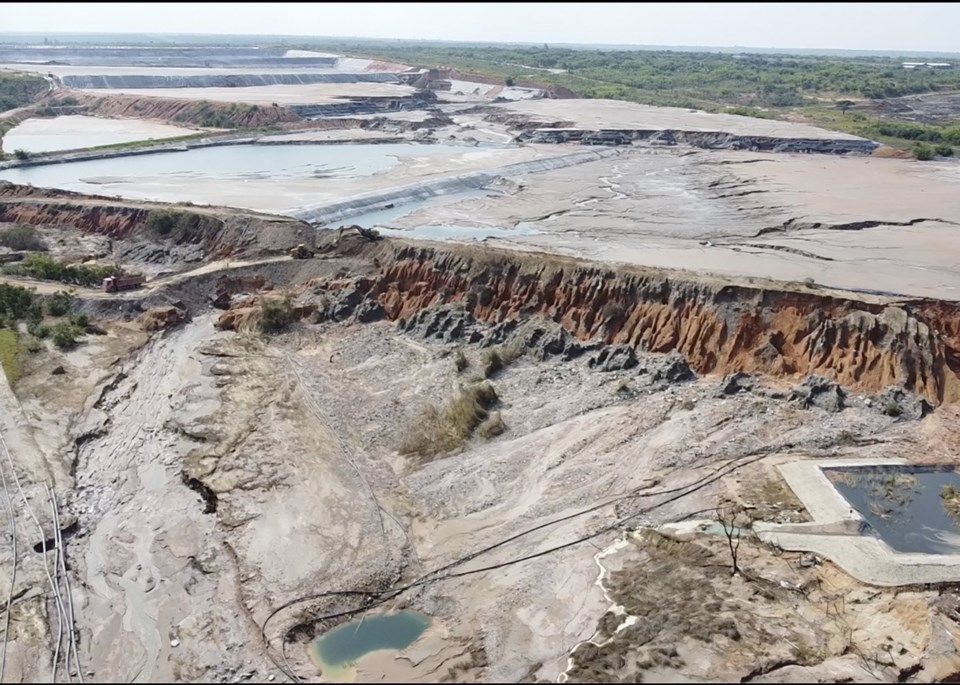Business
Chinese Mining Company Faces Allegations Over Toxic Spill in Zambia

A major toxic spill at a mining site near Kitwe, Zambia, has led to serious allegations against the Chinese company Sino-Metals Leach Zambia. An environmental cleanup firm, Drizit, claims its investigation revealed that the spill released approximately 1.5 million tons of toxic material, significantly higher than the 30,000 tons that Sino-Metals initially disclosed.
The incident, which occurred on February 18, 2023, has raised alarms due to its impact on local communities and ecosystems. The spill contaminated waterways connected to the Kafue River, affecting the drinking water supply for over half of Zambia’s 21 million residents and leading to the death of fish over 100 kilometers downstream.
Investigation Findings and Company Response
Drizit, based in South Africa, conducted a two-month investigation and reported alarming findings. They stated that over 3,500 samples were taken from the affected area, revealing hazardous levels of pollutants such as cyanide, arsenic, copper, and lead. These substances pose significant long-term health risks, including organ damage and cancer.
Despite Drizit’s alarming findings, Sino-Metals disputed the accuracy of the report and terminated Drizit’s contract just one day before the final report was due. The company claimed this was due to “contractual breaches” by Drizit. In a statement provided to The Associated Press, Sino-Metals expressed their commitment to assisting with the cleanup.
In response to the crisis, Zambian President Hakainde Hichilema has called for expert assistance. The government has deployed the air force and speedboats to distribute lime into the river to mitigate the effects of the acid waste. Officials later reported that the situation was under control and that water quality was improving, indicating no immediate cause for alarm.
Ongoing Environmental Concerns
Despite the government’s assurances, Drizit maintains that the environmental damage is extensive and that a thorough cleanup operation is necessary to protect public health in the long term. They estimate that 900,000 cubic meters of toxic substances remain in the environment, which could pose risks for decades if not properly addressed.
The full details of Drizit’s report have not been made public, but the implications of the toxic spill underscore the potential dangers associated with mining operations in Zambia. The situation highlights broader concerns regarding environmental management and corporate accountability within the mining sector, particularly when foreign entities are involved.
As investigations continue, the fallout from this incident raises significant questions about the responsibilities of multinational companies in safeguarding environmental and public health, especially in regions where local communities rely heavily on natural resources for their survival.
-

 Education3 months ago
Education3 months agoBrandon University’s Failed $5 Million Project Sparks Oversight Review
-

 Science4 months ago
Science4 months agoMicrosoft Confirms U.S. Law Overrules Canadian Data Sovereignty
-

 Lifestyle3 months ago
Lifestyle3 months agoWinnipeg Celebrates Culinary Creativity During Le Burger Week 2025
-

 Health4 months ago
Health4 months agoMontreal’s Groupe Marcelle Leads Canadian Cosmetic Industry Growth
-

 Technology3 months ago
Technology3 months agoDragon Ball: Sparking! Zero Launching on Switch and Switch 2 This November
-

 Science4 months ago
Science4 months agoTech Innovator Amandipp Singh Transforms Hiring for Disabled
-

 Education3 months ago
Education3 months agoRed River College Launches New Programs to Address Industry Needs
-

 Technology4 months ago
Technology4 months agoGoogle Pixel 10 Pro Fold Specs Unveiled Ahead of Launch
-

 Business3 months ago
Business3 months agoRocket Lab Reports Strong Q2 2025 Revenue Growth and Future Plans
-

 Technology2 months ago
Technology2 months agoDiscord Faces Serious Security Breach Affecting Millions
-

 Education3 months ago
Education3 months agoAlberta Teachers’ Strike: Potential Impacts on Students and Families
-

 Science3 months ago
Science3 months agoChina’s Wukong Spacesuit Sets New Standard for AI in Space
-

 Education3 months ago
Education3 months agoNew SĆIȺNEW̱ SṮEȽIṮḴEȽ Elementary Opens in Langford for 2025/2026 Year
-

 Technology4 months ago
Technology4 months agoWorld of Warcraft Players Buzz Over 19-Quest Bee Challenge
-

 Business4 months ago
Business4 months agoNew Estimates Reveal ChatGPT-5 Energy Use Could Soar
-

 Business3 months ago
Business3 months agoDawson City Residents Rally Around Buy Canadian Movement
-

 Technology2 months ago
Technology2 months agoHuawei MatePad 12X Redefines Tablet Experience for Professionals
-

 Business3 months ago
Business3 months agoBNA Brewing to Open New Bowling Alley in Downtown Penticton
-

 Technology4 months ago
Technology4 months agoFuture Entertainment Launches DDoD with Gameplay Trailer Showcase
-

 Technology4 months ago
Technology4 months agoGlobal Launch of Ragnarok M: Classic Set for September 3, 2025
-

 Technology4 months ago
Technology4 months agoInnovative 140W GaN Travel Adapter Combines Power and Convenience
-

 Science4 months ago
Science4 months agoXi Labs Innovates with New AI Operating System Set for 2025 Launch
-

 Top Stories2 months ago
Top Stories2 months agoBlue Jays Shift José Berríos to Bullpen Ahead of Playoffs
-

 Technology4 months ago
Technology4 months agoNew IDR01 Smart Ring Offers Advanced Sports Tracking for $169










